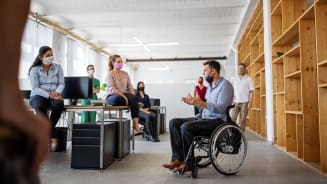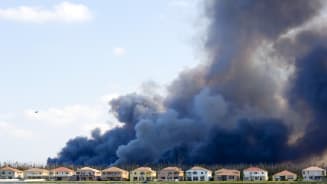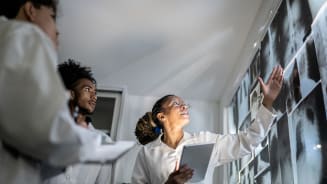
Podcast 21 mins
On Aon Podcast: Better Being Series Dives into Women’s HealthIn an Aon special report, Helping Organizations Chart a Course to The New Better, Aon reveals exclusive research on the issues rising from the COVID-19 crisis and methods of re-introducing fundamental aspects of society and the economy: working, traveling and convening.
As part of this new report, leading global businesses and innovative thinkers reveal their strategies and action plans as they make their way to a New Better.
Here’s Merck KGaA’s story.
The workforce of Merck KGaA¹ (“Merck”) includes more than 56,000 people in 66 countries working across healthcare, life sciences, and performance material. As the company was managing through the immediacy of the pandemic, leadership teams identified crisis best practices being developed that would ultimately shape the “Future of Work” program at Merck.
“We are a very purpose-driven, pragmatic company,” says Alexis Saussinan, Global Head of Strategic Workforce Planning People Analytics. “We want to make meaningful and lasting moves, aligned with our DNA.”
To enable long-lasting change, Merck ensures data serves as the foundation for its strategy. As the company started building the program, it used a range of internal and external data, market trends, and interviews with executives, board members and the crisis management team to help build a complete picture of what was needed.
Four guiding principles shaping its “Future of Work” program were determined: increased work flexibility; sustaining trust and collaboration beyond boundaries; accelerating data and technology in must-win areas; and, lastly, continuing to evolve its leadership culture – including further developing virtual leadership skills, empathy and empowerment.
The company also brought together various business areas for best practice sharing, visibility and transparency, to reach larger objectives — from managing data security and cyber in the virtual world to sustainability to best-in-class digital customer experiences.
Along these principles, five strategic people work priorities were developed:
Culture and collaboration are key to the successful implementation of Merck’s program. “Merck has a very strong and unique culture, and that’s the reason for our success,” says Saussinan. “Our response to the crisis is rooted in our DNA, because we care about our people, patients and customers.”
¹ Merck KGaA is listed German multinational science and technology company headquartered in Darmstadt, Germany. Its majority owners are still the descendants of the founder. Founded in 1668, it has more than 56,000 employees across 66 countries as of 2020.
This case study originally appeared with the special report, Helping Organizations Chart a Course to The New Better. Check out the full report for defining moments of the pandemic, case studies of leading companies navigating change, key insights, and more.
General Disclaimer
The information contained herein and the statements expressed are of a general nature and are not intended to address the circumstances of any particular individual or entity. Although we endeavor to provide accurate and timely information and use sources we consider reliable, there can be no guarantee that such information is accurate as of the date it is received or that it will continue to be accurate in the future. No one should act on such information without appropriate professional advice after a thorough examination of the particular situation.
Terms of Use
The contents herein may not be reproduced, reused, reprinted or redistributed without the expressed written consent of Aon, unless otherwise authorized by Aon. To use information contained herein, please write to our team.
Our Better Being podcast series, hosted by Aon Chief Wellbeing Officer Rachel Fellowes, explores wellbeing strategies and resilience. This season we cover human sustainability, kindness in the workplace, how to measure wellbeing, managing grief and more.

Podcast 21 mins
On Aon Podcast: Better Being Series Dives into Women’s Health
Podcast 38 mins
On Aon’s Better Being Series: The World Wellbeing Movement
Podcast 30 mins
On Aon’s Better Being Series: Mental Health and Creating Kinder Cultures
Podcast 31 mins
On Aon’s Better Being Series: Managing Loss and Grief
Podcast 26 mins
On Aon’s Better Being Series: Measuring Wellbeing
Podcast 27 mins
On Aon’s Better Being Series: Physical Wellbeing and Resilience
Podcast 25 mins
On Aon’s Better Being Series: Human SustainabilityExpert Views on Today's Risk Capital and Human Capital Issues

Article 4 mins
Introduction: Clarity and Confidence to Make Better Decisions
Article 5 mins
The Age of Rising Resilience – An Economic Outlook
Article 6 mins
Building Resilience Against the Constant Cyber Threat
Article 5 mins
Making Better Decisions – A Treasurer’s Perspective
Article 5 mins
How to Balance the Conflicting Forces of Efficiency, Performance and Wellbeing
Article 8 mins
Seizing the Opportunity: Building a Comprehensive Approach to Risk Transfer
Article 5 mins
Tapping New Markets to Unlock Deal Value
Article 7 mins
The Rise of the Skills-Based Organisation
Article 5 mins
Creating a Fair and Equitable Workforce for Everyone
Article 5 mins
The Year of the Vote: How Geopolitical Volatility Will Impact Businesses
Article 5 mins
The Aon DifferenceThe construction industry is under pressure from interconnected risks and notable macroeconomic developments. Learn how your organization can benefit from construction insurance and risk management.

Article 19 mins
How North American Construction Contractors Can Mitigate Emerging Risks
Article 9 mins
Managing Construction Risks: 7 Risk Advisory Steps
Article 14 mins
Unlocking Capacity and Capital in a Challenging Construction Risk Market
Article 12 mins
Protecting North American Contractors from Extreme Heat Risks with Parametric
Article 8 mins
How Climate Modeling Can Mitigate Risks and Improve Resilience in the Construction Industry
Report 1 mins
Construction Risk Management Europe Report 2023
Article 19 mins
Parametric Can Help Mitigate Extreme Heat Risks for Contractors in EMEA
Article 21 mins
How the Construction Industry is Navigating Climate Change
Article 14 mins
Top Risks Facing Construction and Real Estate OrganizationsStay in the loop on today's most pressing cyber security matters.

Cyber Labs 65 mins
Cracking Into Password Requirements
Cyber Labs 60 mins
DUALITY: Advanced Red Team Persistence through Self-Reinfecting DLL Backdoors for Unyielding Control
Cyber Labs 12 mins
Detecting “Effluence”, An Unauthenticated Confluence Web Shell
Cyber Labs 9 mins
Financially Motivated Criminal Group Targets Telecom, Technology & Manufacturing
Article 13 mins
From Risk to Reward: Turning Data Breaches into Deal Value
Article 12 mins
To Combat Cyber Risk, Businesses Invest in Resilience
Article 10 mins
For Cyber Readiness, the CISO and CRO Join Forces
Article 16 mins
Mitigating Insider Threats: Managing Cyber Perils While Traveling Globally
Article 41 mins
Buyer-Friendly Cyber and E&O Market: How to Take Advantage
Article 7 mins
Managing Cyber Risk through Return on Security Investment
Article 22 mins
Top 5 Cyber Threats To Mergers and Acquisitions
Article 10 mins
Cyber Attacks: How to Rapidly Detect, Respond and Contain DamageOur Cyber Resilience collection gives you access to Aon’s latest insights on the evolving landscape of cyber threats and risk mitigation measures. Reach out to our experts to discuss how to make the right decisions to strengthen your organization’s cyber resilience.

Article 17 mins
Why Now is the Right Time to Customize Cyber and E&O Contracts
Article 7 mins
8 Steps Toward Building Better Resilience Against Rising Ransomware Attacks
Article 16 mins
Mitigating Insider Threats: Managing Cyber Perils While Traveling Globally
Article 7 mins
Managing Cyber Risk through Return on Security Investment
Article 10 mins
Mitigating Insider Threats: Your Worst Cyber Threats Could be Coming from Inside
Article 13 mins
Why HR Leaders Must Help Drive Cyber Security Agenda
Article 12 mins
Escalating Cyber Security Risks Mean Businesses Need to Build ResilienceOur Employee Wellbeing collection gives you access to the latest insights from Aon's human capital team. You can also reach out to the team at any time for assistance with your employee wellbeing needs.

Article 7 mins
Three Ways Collective Retirement Plans Support HR Priorities
Article 13 mins
How the Right Employee Wellbeing Strategy Impacts Microstress and Burnout at Work
Podcast 21 mins
On Aon Podcast: Better Being Series Dives into Women’s Health
Article 12 mins
Making Wellbeing Part of a Company’s DNA
Podcast 26 mins
On Aon’s Better Being Series: Measuring Wellbeing
Article 13 mins
Addressing the Wellbeing Disconnect With a Data-Informed Strategy
Podcast 27 mins
On Aon’s Better Being Series: Physical Wellbeing and Resilience
Article 9 mins
Why Workforce Wellbeing is Vital to Company Performance
Article 8 mins
COVID-19 has Permanently Changed the Way We Think About WellbeingExplore Aon's latest environmental social and governance (ESG) insights.

Article 8 mins
ESG Data: How Businesses Can Use Data to Gain an Edge
Article 10 mins
Why ESG Is Even More Important In A Crisis Like COVID-19
Podcast 18 mins
On Aon Podcast: Approach to DE&I in the WorkplaceOur Global Insurance Market Insights highlight insurance market trends across pricing, capacity, underwriting, limits, deductibles and coverages.

Article 17 mins
Q4 2023: Global Insurance Market Overview
Article 17 mins
Top Risk Trends to Watch in 2024How do the top risks on business leaders’ minds differ by region and how can these risks be mitigated? Explore the regional results to learn more.

Article 17 mins
Top Risks Facing Organizations in Asia Pacific
Article 17 mins
Top Risks Facing Organizations in North America
Article 16 mins
Top Risks Facing Organizations in Europe
Article 16 mins
Top Risks Facing Organizations in Latin America
Article 15 mins
Top Risks Facing Organizations in the Middle East and Africa
Article 18 mins
Top Risks Facing Organizations in the United KingdomOur Human Capital Analytics collection gives you access to the latest insights from Aon's human capital team. Contact us to learn how Aon’s analytics capabilities helps organizations make better workforce decisions.

Article 25 mins
How Technology Will Transform Employee Benefits in the Next Five Years
Podcast 19 mins
On Aon Podcast: Technology Impacting the Future of Health and Benefits
Article 18 mins
Integrating Workforce Data to Uncover Hidden Insights
Article 25 mins
How Employers Can Use Data to Improve Their Health Plans
Podcast 26 mins
On Aon’s Better Being Series: Measuring Wellbeing
Article 13 mins
Addressing the Wellbeing Disconnect With a Data-Informed Strategy
Article 14 mins
Designing Tomorrow: Personalizing EVP, Benefits and Total Rewards
Article 10 mins
How to Balance Cost with Growth in a Shifting Talent Market
Article 10 mins
How Companies are Mitigating Rising Medical Costs
Article 11 mins
How Data and Analytics Can Optimize HR ProgramsExplore our hand-picked insights for human resources professionals.

Article 8 mins
COVID-19 has Permanently Changed the Way We Think About Wellbeing
Article 10 mins
DE&I in Benefits Plans: A Global Perspective
Article 11 mins
How Data and Analytics Can Optimize HR Programs
Article 13 mins
Why HR Leaders Must Help Drive Cyber Security Agenda
Article 9 mins
Case Study: The LPGA Unlocks Talent Potential with Data
Article 14 mins
Navigating the New EU Directive on Pay Transparency
Article 12 mins
How to Design Better Talent Assessment to Promote DE&I
Article 8 mins
Training and Transforming Managers for the Future of Work
Article 9 mins
Rethinking Your Total Rewards Programs During Mergers and Acquisitions
Article 19 mins
Building a Resilient Workforce That Steers Organizational Success | An Outlook Across IndustriesOur Workforce Collection provides access to the latest insights from Aon’s Human Capital team on topics ranging from health and benefits, retirement and talent practices. You can reach out to our team at any time to learn how we can help address emerging workforce challenges.

Report 23 mins
A Workforce in Transition Prepares to Meet a Host of Challenges
Article 13 mins
Driving Inclusion and Diversity with Employee Benefits
Article 19 mins
Five Big Human Resources Trends to Watch in 2024
Article 10 mins
How Companies are Mitigating Rising Medical Costs
Report 1 mins
The Global Medical Trend Rates Report 2024
Podcast 27 mins
On Aon’s Better Being Series: Physical Wellbeing and Resilience
Article 13 mins
How the Right Employee Wellbeing Strategy Impacts Microstress and Burnout at Work
Article 13 mins
Addressing the Wellbeing Disconnect With a Data-Informed Strategy
Article 24 mins
Advancing Women’s Health and Equity Through Benefits and Support
Podcast 19 mins
On Aon Podcast: Technology Impacting the Future of Health and Benefits
Article 10 mins
How Collective Retirement Plans Help Support Financial Sustainability
Article 13 mins
Four Ways Retirement Plans Can Reduce the Gender Savings GapOur Mergers and Acquisitions (M&A) collection gives you access to the latest insights from Aon's thought leaders to help dealmakers make better decisions. Explore our latest insights and reach out to the team at any time for assistance with transaction challenges and opportunities.

Article 18 mins
Exit Strategy Value Creation Opportunities Exist as Economic Pressures Persist
Article 9 mins
Future Trends for Financial Sponsors: Secondary Transactions
Article 12 mins
ESG Factors are Carrying Increasing Importance in Mergers and Acquisitions Dealmaking
Article 21 mins
3 Ways to Unlock M&A Value in a Challenging Credit Environment
Article 9 mins
Rethinking the People Costs of Mergers and Acquisitions
Article 9 mins
Rethinking Your Total Rewards Programs During Mergers and Acquisitions
Article 18 mins
Organizational Design and Talent Planning are Key to M&A Success
Article 12 mins
An Ever-Complex Global Tax Environment Requires Strong M&A Risk Solutions
Article 7 mins
Project Management for HR: The Secret Behind a Successful M&A Deal
Article 15 mins
Cultural Alignment Planning Drives M&A Success
Article 13 mins
From Risk to Reward: Turning Data Breaches into Deal ValueHow do businesses navigate their way through new forms of volatility and make decisions that protect and grow their organizations?
Our Parametric Insurance Collection provides ways your organization can benefit from this simple, straightforward and fast-paying risk transfer solution. Reach out to learn how we can help you make better decisions to manage your catastrophe exposures and near-term volatility.

Article 18 mins
Why Parametric Solutions Should Be Part of Your Next Renewal Conversation
Article 11 mins
Parametric Insurance: A Complement to Traditional Property Coverage
Article 11 mins
Using Parametric Insurance to Match Capital to Climate Risk
Article 9 mins
Using Parametric Insurance to Close the Earthquake Protection Gap
Article 19 mins
How Technology Enhancements are Boosting ParametricOur Pay Transparency and Equity collection gives you access to the latest insights from Aon's human capital team on topics ranging from pay equity to diversity, equity and inclusion. Contact us to learn how we can help your organization address these issues.

Article 12 mins
Pay Transparency Can Lead to Better Equity Across Benefits
Article 21 mins
Understanding and Preparing for the Rise in Pay Transparency
Podcast 21 mins
On Aon Podcast: Understanding Pay Transparency Regulations
Article 14 mins
Navigating the New EU Directive on Pay Transparency
Article 13 mins
To Disclose Pay or Not? How Companies are Approaching the Pay Transparency Movement
Podcast 21 mins
On Aon Podcast: Better Being Series Dives into Women’s Health
Article 24 mins
Advancing Women’s Health and Equity Through Benefits and Support
Article 13 mins
Driving Inclusion and Diversity with Employee Benefits
Article 9 mins
Belonging at Work: How Employers can Strengthen DE&I
Article 10 mins
DE&I in Benefits Plans: A Global Perspective
Podcast 18 mins
On Aon Podcast: Approach to DE&I in the WorkplaceForecasters are predicting an extremely active 2024 Atlantic hurricane season. Take measures to build resilience to mitigate risk for hurricane-prone properties.

Article 17 mins
Build Resilience for an Extremely Active Atlantic Hurricane Season
Article 16 mins
Navigating the Challenges of the Year-End Property Market
Article 9 mins
Four Steps to Develop Strong Property Risk Coverage in a Hardening Market
Podcast 18 mins
On Aon Podcast: Navigating and Preparing for Catastrophes
Article 11 mins
Parametric Insurance: A Complement to Traditional Property Coverage
Article 12 mins
Navigating Climate Risk Using Multiple Models and Data Sets
Article 9 mins
Rising Losses From Severe Convection Storms Mostly Explained by Exposure Growth
Article 18 mins
Why Parametric Solutions Should Be Part of Your Next Renewal Conversation
Article 9 mins
Using Parametric Insurance to Close the Earthquake Protection GapOur Technology Collection provides access to the latest insights from Aon's thought leaders on navigating the evolving risks and opportunities of technology. Reach out to the team to learn how we can help you use technology to make better decisions for the future.

Report 24 mins
Evolving Technologies Are Driving Firms to Harness Opportunities and Defend Against Threats
Article 17 mins
5 Ways Artificial Intelligence can Boost Claims Management
Article 7 mins
Artificial Intelligence and the Next Frontier for Financial Institutions
Article 10 mins
Mitigating Insider Threats: Your Worst Cyber Threats Could be Coming from Inside
Article 7 mins
8 Steps Toward Building Better Resilience Against Rising Ransomware Attacks
Article 17 mins
Overcoming the Reputational Cost of Cyber Attacks: The 10-Day Plan
Article 13 mins
Why HR Leaders Must Help Drive Cyber Security Agenda
Article 12 mins
How to Futureproof Data and Analytics Capabilities for ReinsurersTrade, technology, weather and workforce stability are the central forces in today’s risk landscape.

Article 12 mins
Cyber Attack or Data Breach
Article 8 mins
Business Interruption
Article 9 mins
Economic Slowdown or Slow Recovery
Article 12 mins
Failure to Attract or Retain Top Talent
Article 11 mins
Regulatory or Legislative Changes
Article 9 mins
Supply Chain or Distribution Failure
Article 12 mins
Commodity Price Risk or Scarcity of Materials
Article 9 mins
Damage to Brand or Reputation
Article 9 mins
Failure to Innovate or Meet Customer Needs
Article 8 mins
Increasing CompetitionOur Trade Collection gives you access to the latest insights from Aon's thought leaders on navigating the evolving risks and opportunities for international business. Reach out to our team to understand how to make better decisions around macro trends and why they matter to businesses.

Report 4 mins
Global Risk Management Survey
Report 21 mins
Wide-Ranging Trade Issues Confront Global Businesses on Multiple Fronts
Article 9 mins
Four Steps to Develop Strong Property Risk Coverage in a Hardening Market
Article 9 mins
Managing Project Risks: 5 Ways Credit Solutions Can Help
Article 30 mins
Cutting Supply Chains: How to Achieve More Reward with Less Risk
Article 22 mins
Driving Private Equity Value Creation Through Credit Solutions
Article 10 mins
Tips for 2024 Salary Increase Planning
Article 10 mins
4 Steps to Help Take Advantage of a Buyer-Friendly Directors' & Officers' Market
Article 14 mins
Managing Reputational Risks in Global Supply Chains
Article 10 mins
How an Outsourced Chief Investment Officer Can Help Improve Governance and Manage Complexity
Article 11 mins
Decarbonizing Your Business: Finding the Right Insurance and Strategy
Article 13 mins
Reputation Analytics as a Leading Indicator of ESG RiskWith a changing climate, organizations in all sectors will need to protect their people and physical assets, reduce their carbon footprint, and invest in new solutions to thrive. Our Weather Collection provides you with critical insights to be prepared.

Article 17 mins
Build Resilience for an Extremely Active Atlantic Hurricane Season
Report 26 mins
Climate Analytics Unlock Capital to Protect People and Property
Report 4 mins
Climate and Catastrophe Insight
Article 21 mins
How Investors are Making Better Decisions Amid a Changing Climate
Article 10 mins
Improving Agricultural Practices to Address Climate Risks
Article 18 mins
Understanding Freeze Risk in a Changing Climate
Podcast 10 mins
On Aon Podcast: Climate Science Through Academic Collaboration
Article 10 mins
How Companies Are Using Climate Modeling to Improve Risk Decisions
Podcast 9 mins
On Aon Insights: Climate and Supply Chain
Article 11 mins
Using Parametric Insurance to Match Capital to Climate Risk
Article 21 mins
How the Construction Industry is Navigating Climate Change
Article 13 mins
Record Heatwaves: Protecting Employee Health and SafetyOur Workforce Resilience collection gives you access to the latest insights from Aon's Human Capital team. You can reach out to the team at any time for questions about how we can assess gaps and help build a more resilience workforce.

Article 11 mins
Using Data to Close Workforce Gaps in Financial Institutions
Article 9 mins
Using Data to Close Workforce Gaps in Retail Companies
Article 12 mins
Using Data to Close Workforce Gaps in Technology Companies
Article 6 mins
Using Data to Close Workforce Gaps in Manufacturing Companies
Article 12 mins
Using Data to Close Workforce Gaps in Life Sciences Companies
Report 5 mins
Measure Workforce Resilience for Better Business Outcomes
Podcast 20 mins
On Aon Podcast: Methodology to Predict Employee Performance for the LPGA
Article 14 mins
What Does a Resilient Workforce Look Like?
Article 8 mins
Training and Transforming Managers for the Future of Work
Article 19 mins
Building a Resilient Workforce That Steers Organizational Success | An Outlook Across Industries
Article 21 mins
For institutional investors, engaging an outsourced chief investment officer, or OCIO, is one of the most critical decisions an organization can make. Choosing the right partner can lead to achieving the desired results or unexpected consequences.

Article 6 mins
Overview of the current trade credit insurance market and outlook on trend developments.

Article 16 mins
The need to attract and retain high-quality talent in an environment of intense competition is at the forefront of professional services leaders’ minds.

Ready to Explore Further?
Sign up to receive updates on the latest events, insights, news and more from our team.
You will soon receive an email to verify your email address. Please click on the link included in this note to complete the subscription process, which also includes providing consent in applicable locations and an opportunity to manage your email preferences.

Article 5 Min Read

Article 10 Min Read
Your request is being reviewed so we can align you to the best resources on our team. In the meantime, we invite you to explore some of our latest insights below.

Article 5 Min Read

Article 10 Min Read
If encounter an issue, use the link below to start a new download.
Download Now